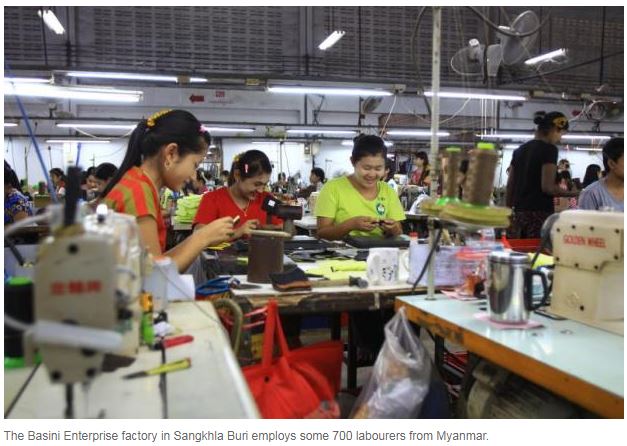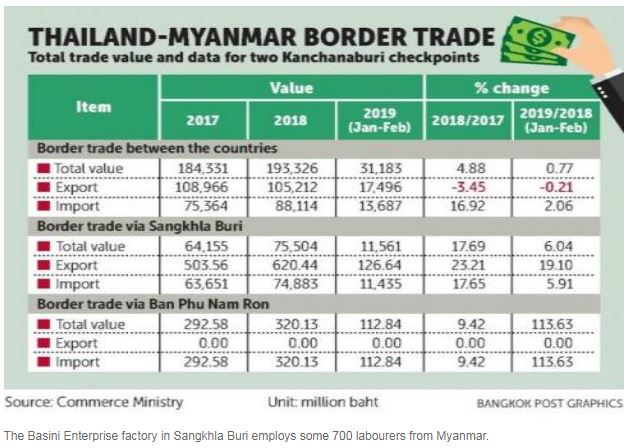Thailand: A step in the right direction
Sumpan Kiatsommart, president of Basini Enterprise, which makes shoes for export, decided 15 years ago to set up a second factory near the Three Pagodas Pass in Sangkhla Buri district, Kanchanaburi, to avoid a labour shortage.
Mr Sumpan’s decision proved sage, as a huge workforce and cheaper wages followed, which increased the company’s export competitiveness.
Founded more than 30 years ago, Basini Enterprise is an original equipment manufacturer of shoes that first set up in Nakhon Pathom province. The company exports shoes to more than 40 countries including the US, Australia, and several in Europe.
“One benefit of building a factory near a border checkpoint is there are many Myanmar labourers ready to work in labour-intensive industries,” he says. “They can work near their home and enjoy a cheap cost of living and better quality of life.”
Mr Sumpan says the factory in Sangkhla Buri employs some 700 labourers from Myanmar and has a production capacity of 40,000-45,000 pairs of shoes per month. The border factory fetched the company around 500 million baht last year.
“Having the factory in a border area reduces foreign worker migration into Thailand,” he says. “Many of them cross the border in the morning and come back home in the evening to their families.”
Mr Sumpan urges the government to upgrade the Three Pagodas Pass to be a permanent port of entry to promote not only border trade, but also investment and tourism activities.
As a temporary border pass site, visitors are not allowed to stay overnight. No customs procedures, quarantine or immigration services are available. A permanent port of entry would mean the existing services plus visa approval allowing visitors to stay overnight.
He says there are more than 50 labour-intensive factories in Sangkhla Buri, spanning from shoes, garments, jewellery and plastics to electronics. Many Taiwanese electronics factories set up shop, moving from Chon Buri.
Three Pagodas Pass is near many big cities and communities in Myanmar such as Payatongsu, Mawlamyine and Bago. Yangon is a seven-hour drive from the border.
There is a steady supply of labourers along the border area while roads are level, unlike the routes through Mae Sot in Tak province that are more difficult because they run through the mountains.
 Jeadsak Iampan, vice-chairman of the Thai Chamber of Commerce in Kanchanaburi, says the government should make Three Pagodas Pass a permanent checkpoint instead of Phu Nam Ron because it would facilitate border trade and has a much larger contingent of Myanmar people.
Jeadsak Iampan, vice-chairman of the Thai Chamber of Commerce in Kanchanaburi, says the government should make Three Pagodas Pass a permanent checkpoint instead of Phu Nam Ron because it would facilitate border trade and has a much larger contingent of Myanmar people.
The government is expanding Phu Nam Ron into a permanent checkpoint.
The road at Three Pagodas Pass is more convenient than the one from Mae Sot to Mawlamyine, which is full of hills, says Mr Jeadsak.
Kanchanaburi has two checkpoints, with mostly export and import activities at Three Pagodas Pass.
Thailand has 41 border checkpoints with Myanmar out of a total of 96 checkpoints, and eight permanent entry ports with Myanmar.
Adul Chotinisakorn, director-general of the Foreign Trade Department, says the department discussed increasing trade and investment via border trade between Thailand and Myanmar with representatives of the local Thai Chamber of Commerce, the Federation of Thai Industries, and related agencies on March 26.
The private sector proposed the government construct a road linking Ban Phu Nam Ron to Ban Htee Kee and Dawei to promote trade, investment and tourism between the two countries after the upgrade of the Phu Nam Ron permanent checkpoint is finished this November.
The government is investing 711 million baht to upgrade the Phu Nam Ron Pass to be a permanent port of entry, with offices for customs service, immigration and quarantine units on 1,300 rai of land.
The Phu Nam Ron checkpoint is meant to become a one-stop service checkpoint in Kanchanaburi for seafood imports from Dawei. Border trade through this checkpoint is expected to grow by 15% after construction is completed.
The Commerce Ministry reported Phu Nam Ron border trade amounted to 320 million baht in 2018, up 9.42% in 2017. In the first two months this year, border trade at the checkpoint surged by 114% from the same period last year to 112 million baht.
Export value through Phu Nam Ron checkpoint remained insignificant because of inconvenient transport.
Border trade volume via Three Pagodas Pass totalled 75.8 billion baht in 2018, up 17.7% from 2017. Trade at the pass accounted for 39% of border trade between Thailand and Myanmar, which tallied 193 billion baht in 2018.
In the first two months of 2019, border trade volume via Three Pagodas Pass was up 6.04% to 11.6 billion baht.
Source: https://www.bangkokpost.com/business/news/1658876/a-step-in-the-right-direction


 English
English




